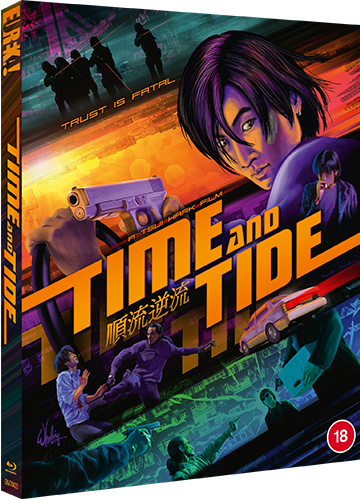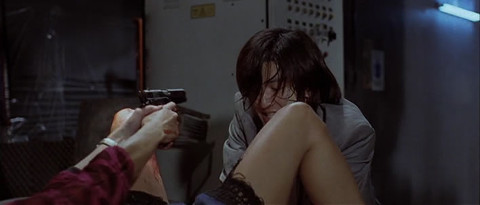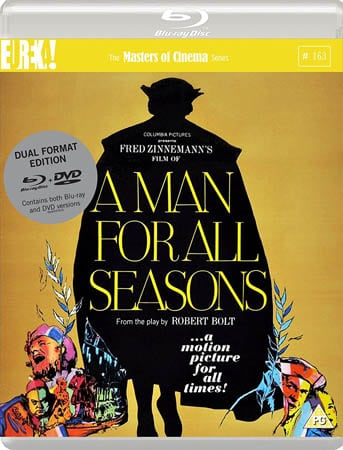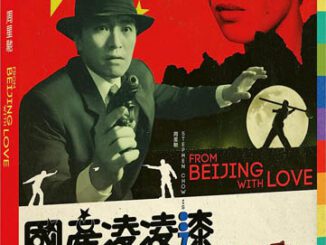Time and Tide (2000)
Directed by: Tsui Hark
Written by: Koan Hui, Tsui Hark
Starring: Candy Lo, Cathy Tsui, Nicholas Tse, Wu Bai
AKA SHUN LIU NI LIU
HONG KONG
AVAILABLE ON BLU-RAY: NOW, from EUREKA ENTERTAINMENT
RUNNING TIME: 113 mins
REVIEWED BY: Dr Lenera

Tyler Kim is a restless 21-year old living in Hong Kong who dreams of living on a South American beach. When he impregnates a lesbian cop, Ah Jo, after a drunken night, he joins an unlicensed bodyguard service led by Uncle Ji to earn money. Nearly nine months later, he meets up with a butcher named Jack and his pregnant wife, Ah Hui, who’s Ji’s daughter and who helps Tyler prevent her father’s assassination at his birthday. Then a group of South American mercenaries turn up; Jack once worked for them and now they want him to kill his father in law. Instead he turns on the mercenaries and it isn’t long before they’re after him, with Tyler also caught up in the action….

Time And Tide is actually relatively simple, but seems really complicated while you’re watching it. The core threads are easily understandable, but subplots and character motivations are extremely jumbled, with scenes and people often introduced randomly and even exiting the film without proper clarification. The breakneck pacing is certainly an achievement and is well maintained, but scenes keep cutting to the next before they’ve properly played out which doesn’t help either. Director and co-writer Tsui Hark’s forte was never storytelling, but he outdoes himself here. But on the other hand, the energy level is certainly infectious and it’s easily to just be swept along by the constant motion, as characters continually fire guns at each other, are thrown all over the place, crash through windows, are pulled down steps by ankle chains, and swing to the ground on fire hoses: basically, they never stop moving, and neither does the camera. It’s one thing to show someone rappelling down the side of the building, but it’s another for the camera to follow his descent. The camerawork is hectic and takes us all over the place, with more “impossible” points of view than any early Dario Argento film, Hark’s three cinematographers Chiu-Lam Ko, Baf Sjarnsuddin and Herman Yua really having their work cut out for them. While the theme of brotherhood spanning two sides of the law is not uncommon, there’s a surprising emotional dimension caused by both of the two main male characters soon to become fathers, this propelling their actions and reactions. While it certainly may not seem that way at first, we do really start to care. I don’t think that the subject of unwed parents was used in many Hong Kong films before this one; maybe it was almost taboo?
The origins of this lie in ideas Hark had for A Better Tomorrow 4. But after A Better Tomorrow 3 flopped, he went to Hollywood to make Double Team and Knock Off which also flopped, so he then returned to Hong Kong, he and co-screenwriter Koan Hui developing material intended for said aborted sequel into a new project. Actor Nicholas Tse opted out of appearing in the sequel to Gen-X Cops to be in Time and Tide, and promptly announced that it would be his last action film as he desired to focus on his musical career, though he ended up in 2001’s My Schoolmate The Barbarian as well. After seeing Wu Bai in the Taiwanese film The Personals, Tsui offered him the role of Jack, and rewrote the character to make him more of a sad loner to match the music he made with his band China Blue. He was asked by Hark to compose a Happy Birthday song for the film that nobody has ever heard of just half an hour before filming, then he was given half an hour again to come up with alternate lyrics for the song, used for a later scene. He also injured himself falling off a trolley and a double performed all the action that came after in the same scene, though you can’t actually tell. Cathy Tsui, who was cast as Ah Jo, found a scene involving her playing with a dog difficult as she was afraid of them. To make her more comfortable, she was sent to a dog farm where she played with dogs every day. Hark’s original cut was over three hours long. He considered it to be too slow paced, so he radically reorganised the entire script, which including cutting many of Tse’s and Anthony Wong’s scenes, though Bai’s sequences were all left in. It was not a huge flop but still disappointed at the box office.
Tyler sometimes narrates and he introduces matters with his version of the Creation which ends with “God had to start all over over” as a series of rather disconnected images are followed by a longer one of a man pestering a woman in the middle of a busy street and getting his just deserts from her. Tyler is working in a night club and gets chatting to a very pretty female customer about booze. Of course the two go and get drunk before throwing up together, and I wish that we had spent some time with these two getting to know each other before we cut to the morning and the two in bed not even remembering if they had sex or not. I know that the first cut of this film was too long, but I’d have sacrificed a few minutes of shooting and leaping for more early footage of these two. Or maybe I’m just getting old. Anyway, Ah Jo turns out to be three things that are no good to Tyler; an officer of the law, a lesbian, and pregnant. She doesn’t want anything to do with him, even after almost a year when he has a job and is able to give her money. One of several amusing touches has her dog chew up the first bundle of notes he puts under her apartment door; the next time we see the dog it’s wearing a muzzle. Tyler joins this bodyguard service which is ran by Uncle Ji [Anthony Wong unusually low key] and is largely “staffed with guys who owe him money”. He befriends Jack and is lumbered with driving around to the airport this witness they’re supposed to be protecting; in response to her asking for his number, he drives his car backwards incredibly fast, a scene that’s unintentionally funnier than intended because you can see loads of extras standing and watching. Indeed he’s still hardly a noble chap, prone to stealing any money that’s lying around even if he often gives it to Ah Jo. But he becomes quite good at this bodyguard business while never becoming a skillful, invincible hero, which is a refreshing change. He doesn’t even carry around a real gun.

Meanwhile some mercenaries are robbing a bank, though the scene is handled in a confusing way with emphasis on religious iconography to boot, an emphasis nowhere else in the film. Jack obviously has some background with this lot and flees with the bank money after shooting their leader, then drops Ah Hui off at her father’s mansion, giving her a key to a train station locker and telling her to go there when their child is born. Tyler knows about Jack but doesn’t tell the police and breaks into Jack’s apartment only to notice that Jack and his men and the Angels all have the place staked out. Some relationships and strands are hard to make out, though this wouldn’t t be the case of things were told linearly and in a less hurried fashion. Sometimes we only get a hint of what’s happened and the film moves off in an unexpected direction, only to then return and more fully tell you what occurred earlier. One can certainly have admiration for this almost experimental method of storytelling, but for it to work the film needed to be a bit slower paced so we’re able to take more in. Otherwise, it often seems like overload. Complications diminish as the action totally takes over for the second half which is basically comprised of two extended action sequences. Good guys, bad guys and guys who are sort of in between fight, fire and leap over and over again, but boredom never sets in because there’s some variety in what we see – One minute two people are shooting each other and the next minute they’re doing death-defying rolls and jumps while the action continually moves all over the settings, never being restricted to one small area even when characters are in great pain. But what about these two pregnant women? One of them ends up in the thick of things but has to be looked after by the father of the other woman’s child!
Of course it all gets increasingly unbelievable but it’s the same with filmmakers like John Woo and Ringo Lam whose work may have influenced Hark’s here as well as, I think, Wong Kai Wai – the style is often really similar. In any case, you just have to go with the absurdities and the over the top elements which western filmmakers working in the same genre would often hold back on. And yet, while this is a film in which, for example, somebody throws a hand grenade down to the guy beneath him who catches it and throws it back killing the above guy, Hark tries in places to be reasonably realistic, with no scenes of one man gunning down thirty people in just a few seconds, or indeed very little actual martial arts. There are several fight sequences, full of agility and people taking a hell of a lot of punishment, though low on skillful technique. While the finale is indeed tense and by now we’re really invested in the characters so we care about the outcome, it’s the lengthy apartment block set piece before which is the film’s highlight and which seems even more impressive when you know that it was filmed in a real urban maze of doors, hallways and apartment buildings connected with a centre court yard. It’s superbly sustained stuff only weakened by two shoddy CGI explosions; yes, I get that they couldn’t have really blown anything up there, but the shoddiness of the effects really ruin one of Hark’s most outlandish moments where we go into an explosion replete with dying pigeons. But then I remember how Takashi Miike, a filmmaker I’ve become a big fan of in recent years after not being sure about him for a long time, kept on using poor CGI, not caring how it looked, even liking the way it looked, for a long time until the overall standard of digital effects substantially improved.
We also get views from underneath a glass table, from inside a washing machine and from inside the case of money, though these don’t tend to be dwelt on. Though generally, rather than really fast cutting, Hark will prefer to have long takes where the camera goes everywhere – there’s a tremendous one where we follow somebody about and the camera goes on top of some lockers to keep him in view. We also get freeze framing, slow motion, jump cuts so that sometimes shots are missing, split screen and ‘shaky cam’ thrown at us in quick succession. Sometimes it gets a tad wearing, yet Hark never loses sight of the driving idea of two young fathers who, though not at all model citizens, seek redemption from their pasts and strive for a brighter future for their families and themselves. All the mayhem having this emotional centre really helped for me a film which, to be honest, I wasn’t really “feeling” for large chunks of its first half, where I feel the deliberately confusing storytelling and over-direction worked against it even though I have greatly enjoyed such things in some other films. And I wonder if, in being shortened to a length which would ensure it was far more likely to make money, it lost some almost vital material in some of the early portions which would have provided us with some grounding as well as more understanding of these characters. But Nicholas Tse and Wu Bai are reasonably strong enough in the two lead roles, even though I’d say that their female counterparts Cathy Lo and Candy Lo were a tad better. Lo has the film’s most heartwarming moment where, half way through, she smiles for the first time. It’s lovely. Despite being rather exhausting in the wrong way, Time And Tide remains a major Hark work, and amidst all its sound and fury you may be surprised how much you become emotionally involved.
.
SPECIAL FEATURES
Limited Edition O-Card slipcase featuring new artwork by Darren Wheeling [2000 copies]
1080p presentation on Blu-ray for the first time in the UK
It doesn’t say that this is a new transfer, though it looks fairly impressive anyway, the picture very sharp and handling all the film-making stylistics employed. A few excessive clusters of grain here and there, probably unavoidable due to the complexity of some of the images, were all I noticed as flaws.
Cantonese, Mandarin and English audio options, all presented in 5.1 DTS-HD MA
I watched the Cantonese version, but did sometimes switch over to the English dub. It’s a lot better than you may expect, the voice actors well chosen and delivering their lines with some skill.
Optional English Subtitles
Optional English SDH
Feature length audio commentary by writer, producer, and director Tsui Hark
This track was on the Region 1 Columbia/Tristar DVD and several subsequent releases. Hark tends to give fairly good tracks, this one being typical, with lots of information on various scenes and the production, though also with some explaining of the plot and what’s happening on screen. We learn about some of the cutting down, including how shots from deleted scenes would be cut into others and how the scene of Tyler and Ah Jo in bed had to be removed because Ah Jo was under 18, are told how a near suicide attempt had to not be shot because the hotel they were filming in wouldn’t allow it, and learn that many of the more gimmicky touches were reshoots with Hark thinking what he’d originally shot or had been edited was too conventional. Certainly worth a listen.
Brand new feature length audio commentary by Asian film expert Frank Djeng (NY Asian Film Festival)
Instead of the three featurettes that were on the French Blu-ray release from Carlotta Films, we get yet another most welcome commentary from the increasingly busy Djeng, who probably doesn’t need to keep telling the listener his credentials at the start of each track, but who clearly loves and admires this film, even the things I wasn’t too hot on. He doesn’t go into the production as often as we might expect, even though we do learn things like how they shot the ‘falling camera’ scenes. However, he analysis in depth the visual techniques for scene after scene, shows how this film in many ways updates traditional martial arts and wushu movies, and points out all the locations. Both tracks overlap very little.
Original trailer
Limited Edition collector’s booklet featuring new writing by Chinese-language film expert and author Stephen Teo [2000 copies]
Hark’s almost out of control tweaking of heroic bloodshed conventions makes for a tiring but undeniably often thrilling experience. Recommended.







Be the first to comment